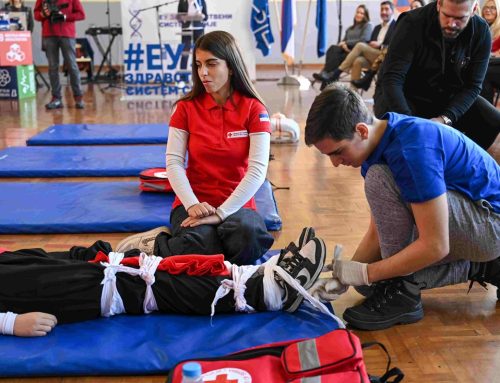A significant step in Serbia’s process of accession to the European Union is the harmonisation of its national legal framework, particularly in the areas outlined in EU Accession Chapters 23 and 24. One such area is the protection and support of victims and witnesses of crime, which is crucial for the nation’s judicial reform.
In 2018, the OSCE launched the “Support for Victims and Witnesses of Crime in Serbia” project, a €1.5 million EU-fully funded initiative aimed at establishing a nationwide support system for victims and witnesses.
The project focused on several critical objectives aimed at enhancing the support system for victims and witnesses of crime in Serbia. It prioritised the establishment of a comprehensive network of Victim and Witness Support Services across the country. Additionally, the project contributed to the development of a National Strategy for Victims’ Rights, accompanied by an actionable plan to guide implementation. To ensure effective oversight, a National Coordination Body, led by the Ministry of Justice, was formed to oversee the realisation of victims’ rights.

The project also supported amendments to Serbia’s criminal legislation, aiming to create a victim-centred legal framework. To build institutional capacity, partnerships with various academies and training centres were established, ensuring that key actors received the necessary training and expertise.
The President of the Supreme Court, Jasmina Vasović, emphasised that this project is important both for reform in Serbia and for harmonisation with EU regulations.
“One of the most important elements is that it improves the fairness of criminal procedures,” said Vasović.
She added that changes to the criminal code are underway, which will further contribute to improving fairness. The goal is also to establish victim and witness support services at all higher courts in Serbia.
As the project concludes, it has laid a solid foundation for Serbia’s continued progress in meeting EU standards for victim and witness support. By establishing a coordinated, institutional approach to victim protection, Serbia is now closer to providing comprehensive support and safeguarding for all crime victims.

“EU policy calls for the legal systems to ensure a victims-centred approach as a minimum standard- such as the right to legal aid, protection, social and psychological support and financial compensation to victims of crime. Support to victims and witness of crime is a very complex area, Serbia has taken several positive steps to address the issues and some progress has been made, INCLUDING thanks to this fully-financed EU project implemented by OSCE. However, more progress are expected to come closer to EU standards and to improve protection, support and dignity to citizens of Serbia when they are victims and witness of crime”, said Nicola Bertollini, Head of Cooperation of the EU Delegation to Serbia.
Over the past five years, the OSCE Mission to Serbia has played a pivotal role in advancing victims’ rights in the country. From integrating these rights into Serbia’s 2013-2018 National Judicial Reform Strategy to supporting the creation of Victim and Witness Support Services in Higher Courts and Public Prosecutors’ Offices, the OSCE has been a vital partner. Additionally, it has offered capacity-building initiatives for key judicial actors, ensuring that the system is equipped to protect vulnerable groups.
According to the head of the OSCE Mission in Serbia, Jan Bratu, this organisation has been helping Serbia establish a strong judicial system for years, and the project “Support to Victims and Witnesses of Criminal Acts” is one of the steps towards that goal.

He added that one of the significant aspects this project addressed, in addition to supporting victims, was preventing their secondary victimisation.
“The training and guidelines carried out with the Ministry of the Interior, as the first instance that comes into contact with victims, aim to prevent secondary victimisation. The importance of victim-centred policies is immense, which is why this project was developed to make the judicial system more focused on the victim, as that is the only way to ensure a fair criminal procedure,” Bratu pointed out.




